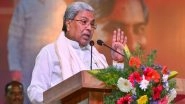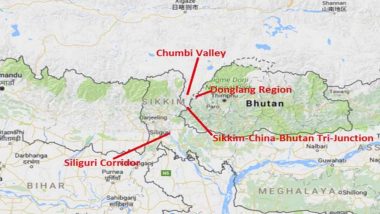China has quietly resumed its activities in the Doklam area and neither Bhutan nor India has sought to dissuade it, a top U.S. official has said while comparing Beijing's actions in the Himalayan region with its manoeuvres in the disputed South China Sea.
"I would assess that India is vigorously defending its northern borders and this is a subject of concern to India," Alice G Wells, the Principal Deputy Assistant Secretary of State for South and Central Asia told lawmakers during a Congressional hearing while responding to a question on China's increased road building activities along the Indian border.
"As (India) ahead to its own strategic stability, it certainly helps drive and is a factor in driving closer partnership that we enjoy with India," Wells said in response to a question from Congresswoman Ann Wagner.
India and China have clashed repeatedly over territories in the Himalayas. Most recently Chinese and Indian troops faced off on the disputed Doklam plateau between Bhutan and China after the Chinese People's Liberation Army began building roads through the area, Wagner said.
"Although both countries backed down, China has quietly resumed its activities in Doklam and neither Bhutan nor India has sought to dissuade it…How should our failure to respond to the militarisation of the South China Sea inform the international response to these Himalayan border disputes?" Wagner asked.
As the U.S. looks to the Indo-Pacific strategy put forward by the Trump administration, Wells said it has been taken in light of the 'South China Sea's Strategy', "How do we maintain the region to be open, to have maritime security, to not have militarisation that would imperil the 70 per cent of global trade?" she asked.
"We need to do that by giving authority to sovereign nations to have choices in how they develop, to have choices in their partnerships," Wells said.
Congressman Ted Yoho, Chairman of the House Foreign Affairs Sub-Committee on Asia and the Pacific, raised the issue of China's aggressive posture in South Asia. "What are your thoughts on what is the best way to counter China in that region?" Yoho asked.
U.S. should not be seeking to compete with China dollar for dollar, Wells responded, adding that instead of a state lending on terms that may not be to the benefit of countries or their citizens, the U.S. and its companies are providing USD 850 billion in foreign direct investment in the region, which is far more than what has been injected by China.
"We're trying to gather likeminded countries who can bring resources to the table, who can coordinate assistance and an effort so as to provide countries with meaningful alternatives," Wells said.
Meanwhile despite the Indian government’s assurance, those keeping track of China’s activities have repeatedly warned that China is still carrying out construction activity on Doklam. Brahma Chellaney recently tweeted, “China’s stealth war in the Himalayas: Isn’t it extraordinary that China — having quietly gained control of much of the Doklam Plateau, which tiny Bhutan regards as its integral part — sends its vice foreign minister to Bhutan to exert pressure to let it open its embassy there?” in reference to Vice Foreign Minister of China’s visit to Bhutan earlier this month.
China's stealth wars in the Himalayas: Isn't it extraordinary that China — having quietly gained control of much of the Doklam Plateau, which tiny Bhutan regards as its integral part — sends its vice foreign minister to Bhutan to exert pressure to let it open its embassy there?
— Brahma Chellaney (@Chellaney) July 24, 2018
Doklam, or Donglang in Chinese, is an area spread over less than a 100 sq km comprising a plateau and a valley at the trijunction between India, Bhutan and China. It is surrounded by the Chumbi Valley of Tibet, Bhutan’s Ha Valley and Sikkim.
Despite several rounds of engagement between China and Bhutan, the dispute between the two over Doklam has not been resolved. It flared up in 2017 when the Chinese were trying to construct a road in the area, and Indian troops, in aid of their Bhutanese counterparts, objected to it, resulting in the stand-off. Doklam is strategically located close to the Siliguri Corridor, which connects mainland India with its north-eastern region. The corridor, also called Chicken’s Neck, is a vulnerable point for India. (With Agency inputs)
(The above story first appeared on LatestLY on Jul 26, 2018 04:36 PM IST. For more news and updates on politics, world, sports, entertainment and lifestyle, log on to our website latestly.com).













 Quickly
Quickly


